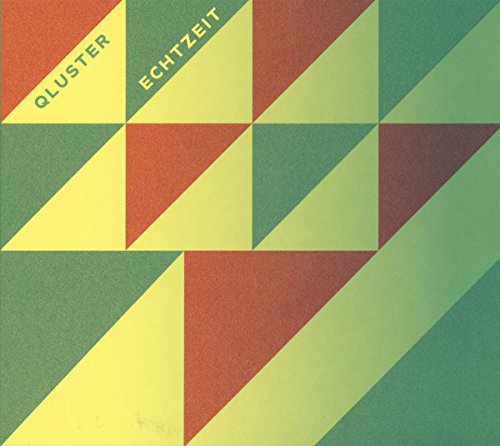
Qluster
Echtzeit
Release Date: Mar 4, 2016
Genre(s): Electronic, Experimental, Avant-Garde, Pop/Rock, Experimental Ambient, Experimental Electronic, Kraut Rock
Record label: Bureau B
Music Critic Score
How the Music Critic Score works
Buy Echtzeit from Amazon
Album Review: Echtzeit by Qluster
Very Good, Based on 7 Critics
Based on rating 4/5
The early 70s albums released as Cluster by Hans-Joachim Roedelius and Dieter Moebius were landmarks in German electronic music, dispensing with beats to chart post-apocalyptic electronic soundscapes and influencing Bowie, John Foxx and Brian Eno, who collaborated on several sets. Roedelius pursued other projects while Cluster continued sporadically, including Harmonia with Michael Rother and a solo career which saw his prolific output intensify to 10 albums a year, including the Selbstportrait sets which forged his trademark style of melodic pianos and shadowy electronics. When Cluster returned to record 2009’s Qua, Roedelius created Qluster after keyboardist-electronic musician Onnen Bock replaced the departing Moebius, joined by multi-instrumentalist Armin Metz for 2013’s Antworten and piano trio explorations of Tasten.
Based on rating 8/10
With Hans-Joachim Roedelius being the main driving force behind Qluster, formerly Kluster and Cluster, you would think that this recently developed trio would serve as a playground for any strange electronic whim that floated his way. It certainly was that way for a time, but last year’s entirely acoustic Tasten certainly shot holes in that notion. Roedelius loves pianos so much he decided to use Qluster as a vehicle for an all-piano album, but Echtzeit, billed as a return to electronics for Roedelius and company, is yet another curveball.
Based on rating 7/10
The sixth full-length by Qluster finds the trio of Hans-Joachim Roedelius, Onnen Bock, and Armin Metz creating their most sparse, tuneful material to date, with Roedelius' piano melodies taking center stage. Based on extended improvisational sessions, much of the album was recorded in a church, and it maintains a somber, meditative, even sacred quality. This isn't to say that there isn't a sense of playfulness to it, but it's not the same sort of hazy, ethereal shuffle as mid-'70s Cluster albums like Zuckerzeit (although the brief "Zweites Kapitel" sneaks in a faint echo of that album's motorik drum-machine pulsations).
Based on rating 7/10
One half of classic Krautrock first-wavers Cluster, Hans-Joachim Roedelius has been making music under the name Qluster since he and musical partner Dieter Moebius parted ways in 2010. But Roedelius has always been a true musical vagabond, putting out over 70 albums throughout the last 55 years as a solo artist and collaborator.Echtzeit, his sixth album as Qluster (with Onnen Bock and Armin Metz) is their first release since Moebius' death last summer, and it finds Roedelius in a contemplative but expressive mood. Heavily arranged around Hans-Joachim's piano playing, much of the music on Echtzeit is surprisingly melodic, as Qluster keeps a thawing pace throughout the album.
Based on rating 6/10
Of all the legendary German bands to have found new directions for music in the 1970s, Cluster were perhaps the most enigmatic. The duo of Hans-Joachim Roedelius and Dieter Moebius (RIP) created music with a flow and grace that topped that achieved even by their most illustrious peers (with the possible exception of Neu! and Tangerine Dream). Yet they were never as straightforward as they sometimes appeared, their hazy electronic soundtracks seeming paradoxically linked to both the future and the past.
Opinion: Excellent
Qluster — Echtzeit (Bureau B)In a fairly recent interview, Steve Swallow and Carla Bley were discussing the lack of cliché in Bley’s playing. I kept thinking of that conversation when listening to this sixth offering from the revitalized Qluster, active in this incarnation since 2011. Following the departure of founding member Dieter Moebius in 2010, a new and prolific phase was inaugurated; Echtzeit is simultaneously its latest manifestation and a bold departure.Qluster has been a trio for the last few years, as Onnen Bock and Armin Metz collaborate with founder Hans-Joachim Roedelius, but Echtzeit finds the group’s concerns with motive, pattern and effect stripped down to an essence.
Opinion: Excellent
Everything in the garden is beautiful and calm. As solo performer and artist, Hans-Joachim Roedelius has pursued a particularly verdant and fragrant strain of electronica both reflecting upon and diverging away from his work as one half of Cluster with Dieter Moebius. As Cluster evolved from the broiling industrial hiss of their earliest recordings into a more streamlined and rarefied proposition, the young radicals fleeing grime-encrusted cities for tranquil repose as men of arable and fertile land, so Roedelius's solo albums became the sharply sweetened counter to Moebius's grit and rough-edged clarity.
'Echtzeit'
is available now

